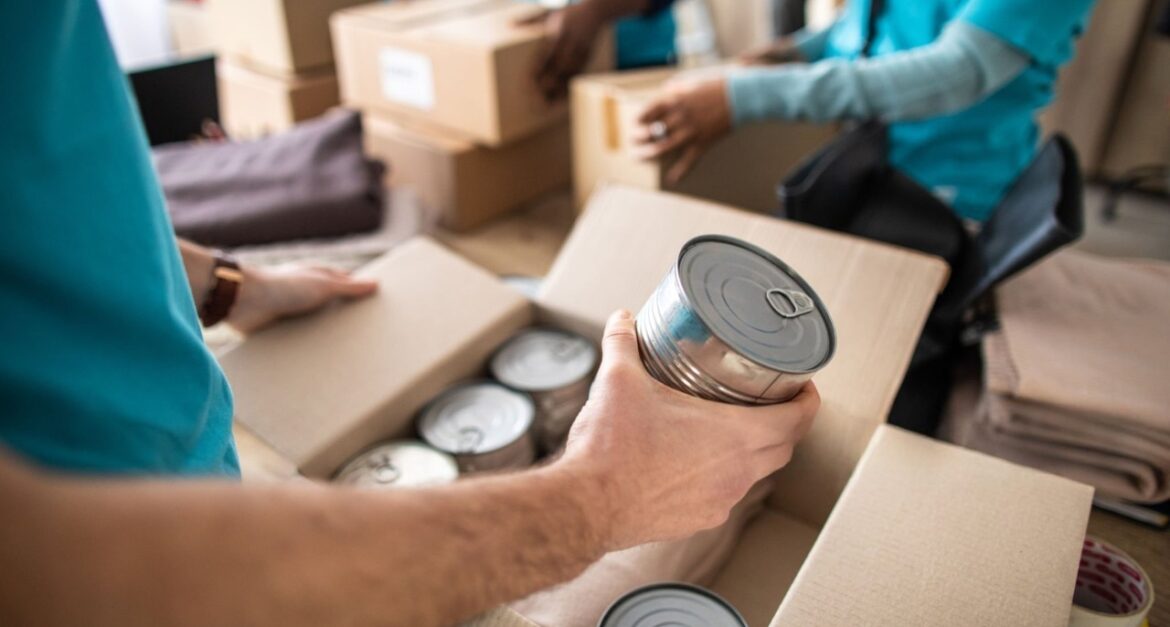

Introduction: Where Logistics Meets Humanity
Every minute mattered in humanitarian crises. In case of balancing lives, the performance of logistics determines the distinction between disorder and well-organized aid. The humanitarian activities in Saudi Arabia do not rely on trucks and warehouses but rather on regulatory acuity. Starting with medical tents and food kits and moving on emergency vehicles and drugs, all imported relief goods are to be in line with HS codes of humanitarian aid KSA and national import regulations under ZATCA, SFDA, and SASO.
These codes are not just numbers but they are the language of international commerce and emergency management. In the case of logistics firms such as Palm Horizon KSA, a command of this language translates into instant action in terms of regulations. It implies that all humanitarian deliveries to the destination must pass through the customs without failure, arrive safely and complete their task of saving lives.
The specialized humanitarian division of Palm Horizon works with the Saudi Red Crescent Authority (SRCA) and governmental agencies to transfer aid with a purpose to help the displaced family in need by providing food and relief medicines in remote locations, setting up medical shelters during floods, and more.
This manual explores in-depth the Hs codes, compliance procedures, and operation models that characterize relief logistics in Saudi Arabia nowadays – giving an action-focused, step-by-step perspective to NGOs, suppliers, and government agencies involved in humanitarian imports.
What Are Humanitarian Aid HS Codes and Why They Matter
HS (Harmonized System) codes are 6 digit standardized numbers used all over the world to categorize traded goods. They set the import duties, documents, and regulations. In humanitarian logistics, the appropriate Hs-code will take care of your shipment being recognized as the aid, and in many cases, be exempted or cleared faster.
The customs authority of Saudi Arabia- Zakat, Tax and Customs Authority (ZATCA) utilises HS codes in order to check the authenticity, safety and the end-use of relief shipments. Missclassified and undocumented humanitarian cargo can also be charged with undue delay, despite the desire being to aid in need.
Proper Hs coding is thus, a legal and moral obligation. To prevent the occurrence of customs disputes and other challenges, Palm Horizon humanitarian compliance staffs ensure that all packages of aids comply with import standards of aid compliance KSA.
Expanded HS Code List for Humanitarian & Relief Supplies (2025 Update)
| Category | Description | KSA HS Code | Authority/Approval |
| Medical Tents | Inflatable or collapsible shelters for field hospitals | 6306.22.00 | SASO |
| Food Kits | Non-perishable food relief packs | 2106.90.99 | SFDA |
| Emergency Vehicles | Ambulances, rescue and disaster response trucks | 8705.90.00 | SRCA |
| Relief Medicines | Antibiotics, vaccines, essential drugs | 3004.90.10 | SFDA |
| Portable Generators | Power backup for medical camps | 8502.11.00 | SASO |
| Water Filtration Units | Portable purification systems | 8421.21.00 | SASO |
| Sanitation Kits | Hygiene essentials and cleaning materials | 3401.19.00 | SFDA/SASO |
| Blankets & Bedding | Relief blankets and sleeping bags | 6301.40.00 | SASO |
| Tents Accessories | Ropes, poles, canvas parts for tents | 6307.90.90 | SASO |
| PPE Kits | Gloves, masks, gowns for relief workers | 3926.20.00 | SFDA |
| Medical Equipment | Diagnostic and emergency response devices | 9018.90.00 | SFDA |
| Blood Pressure Devices | Portable monitoring kits | 9027.80.00 | SFDA |
| Oxygen Cylinders | Medical-grade oxygen supply | 7311.00.00 | SFDA |
| Cold-Chain Boxes | Refrigerated containers for vaccines | 8418.69.00 | SFDA |
| First-Aid Kits | Emergency medical response packs | 3006.50.00 | SFDA |
| Emergency Lighting | LED and solar lamps for field camps | 9405.40.90 | SASO |
| Communication Radios | Handheld and satellite radios for coordination | 8525.60.00 | CITC Approval |
| Rescue Tools | Hydraulic and manual extraction tools | 8205.59.00 | SASO |
| Field Cooking Equipment | Mobile stoves, heating devices | 7321.11.00 | SASO |
| Temporary Housing Units | Prefabricated portable structures | 9406.00.10 | SASO |
Each of these categories falls under a specific humanitarian aid HS code to simplify clearance. Mislabeling or incomplete HS identification can cause days of delay — something Palm Horizon actively prevents through pre-verification and digital compliance checks.
The Compliance Framework: Who Regulates What in Humanitarian Logistics
Saudi Arabia’s import structure for humanitarian aid involves three primary authorities, each focusing on distinct responsibilities:
1. Saudi Red Crescent Authority (SRCA)
- Approves all medical and relief shipments entering under humanitarian classification.
- Validates the legitimacy of aid consignments in partnership with global NGOs or government sponsors.
- Oversees the movement and distribution of emergency medical and rescue vehicles.
2. Saudi Food and Drug Authority (SFDA)
- Regulates all consumables — including medicines, food kits, water purifiers, and hygiene products.
- Requires batch registration, labeling, and expiration tracking for relief goods.
- Ensures that imported pharmaceuticals are registered under approved global standards (WHO/GMP).
3. Saudi Standards, Metrology and Quality Organization (SASO)
- Oversees product quality, durability, and safety for items like tents, power generators, and vehicles.
- Issues Certificate of Conformity (CoC) and mandates SABER platform registration before shipment.
- Ensures imported materials meet national safety benchmarks during emergencies.
Palm Horizon works with all three to pre-clear documentation before goods arrive, ensuring the customs process takes hours, not days.
Palm Horizon’s Compliance Advantage
Where many logistics companies rely on generic documentation, Palm Horizon KSA has developed a specialized compliance protocol:
- Digital Pre-Verification: Every shipment undergoes HS code validation before departure.
- SASO-SFDA Alignment: Certificates are matched to item specifications to prevent rejection.
- Real-Time Coordination: Dedicated compliance officers coordinate with SRCA and customs teams.
- AEO Alignment: As part of Authorized Economic Operator (AEO) best practices, Palm Horizon ensures secure supply chain integrity for aid shipments.
This structure transforms bureaucratic hurdles into a seamless clearance pathway — a critical capability in humanitarian emergencies.
Why HS Codes Are Crucial in Aid Supply Chains
In typical commercial imports, an incorrect HS code might cause a delay or fine. But in humanitarian logistics, the stakes are higher — delays can cost lives.
Each digit in the HS code determines:
- Duty exemption eligibility under Saudi relief policies.
- Safety inspection level by SFDA or SASO.
- Transit permissions through high-security zones.
Palm Horizon’s in-house experts use AI-supported validation tools (aligned with ZATCA databases) combined with manual verification by trained compliance specialists — ensuring zero mismatches between invoice descriptions and declared HS codes.
This hybrid verification method results in faster clearance and consistent regulatory trust, vital for NGOs and government donors shipping under humanitarian exemptions.
Implementation: How Palm Horizon Executes Humanitarian Import Operations
Step 1: Pre-Classification & HS Code Validation
Before any humanitarian shipment leaves its origin country, Palm Horizon’s documentation team begins HS code verification using the official ZATCA customs classification database. Each product — whether a medical tent or oxygen cylinder — is cross-checked for accurate coding.
Misclassification is one of the leading causes of customs delays in Saudi Arabia. Palm Horizon eliminates that risk by conducting dual-level verification:
- Automated validation through trade database systems.
- Manual compliance check by certified customs professionals.
This guarantees that humanitarian shipments are correctly marked as exempt from commercial tariffs under aid import compliance KSA regulations.
Step 2: Documentation and Certification
Once HS codes are locked, the next phase involves gathering essential documentation for each category:
- SFDA Certificates for medicines, water filters, and food kits.
- SASO CoC (Certificate of Conformity) for tents, vehicles, and electrical equipment.
- Red Crescent Authorization verifying humanitarian use.
- Origin and Donation Declarations for NGO or government-sponsored consignments.
All documents are uploaded to Saudi Arabia’s FASAH e-portal, the unified platform for import clearance, minimizing physical paperwork and enhancing traceability.
Step 3: Customs Pre-Filing and Clearance Optimization
Palm Horizon’s team pre-files customs entries with ZATCA even before the vessel arrives. This proactive filing ensures that once the shipment lands, it’s already positioned for clearance.
The company also leverages AEO (Authorized Economic Operator) status — a globally recognized program that prioritizes compliant, secure logistics operators for faster customs clearance.
By aligning humanitarian shipments under AEO standards, Palm Horizon achieves:
- Reduced inspection rates.
- Priority handling in emergency ports.
- Seamless cross-border movement with SRCA escort.
Step 4: Delivery and Distribution Logistics
Once cleared, the goods are handed over to Palm Horizon’s inland logistics network for final distribution. From Riyadh to Jeddah, and from coastal relief hubs to remote desert settlements, every delivery is tracked via GPS and verified by digital proof-of-delivery systems.
For high-priority missions — such as disaster response or epidemic control — Palm Horizon partners with SRCA to deploy airside clearance, allowing cargo to move directly from airport warehouses to emergency sites within hours.
Real-World Use Cases of Humanitarian HS Code Operations in KSA
1. Flood Relief Operations in Jeddah (2024)
Furthermore, Palm Horizon’s humanitarian logistics team has handled the importation of prefabricated shelters (HS Code 9406.00.10) and emergency lighting systems (HS Code 9405.40.90) — both critical assets in refugee response efforts. By partnering with international organizations, the company ensures that every shipment supports relief operations that are compliant, timely, and impactful.
The SRCA acknowledged Palm Horizon’s role in accelerating the aid delivery timeline — demonstrating how precise HS coding directly supports humanitarian effectiveness.
2. Pandemic-Era Medical Supply Imports
When global logistics chains were paralyzed during pandemic restrictions, Palm Horizon facilitated large-scale imports of PPE kits (HS code 3926.20.00) and oxygen cylinders (HS code 7311.00.00).
Working directly with SFDA, the company ensured proper licensing and registration, preventing costly rejections.
Within 72 hours of arrival, the first batch of equipment was distributed to remote hospitals and Red Crescent field centers — a milestone in relief logistics Saudi Arabia history.
3. Refugee Support and Temporary Shelters (Northern Border Regions)
Additionally, Palm Horizon’s humanitarian division has successfully managed imports for prefabricated shelters (HS Code 9406.00.10) and emergency lighting systems (HS Code 9405.40.90). These operations, conducted in coordination with international organizations, have supported refugee response missions across Saudi Arabia with precision and compliance.
By linking documentation to SRCA’s digital tracking systems, the company ensured full traceability — from port clearance to deployment in the field.
Comparing Palm Horizon’s Relief Logistics to Competitors
| Feature | Generic Freight Forwarders | Palm Horizon Humanitarian Division |
| Regulatory Expertise | Limited to basic commercial codes | Specialist in SFDA, SASO, and SRCA aid compliance |
| Documentation Speed | Manual, multi-day process | Fully digital, pre-verified filing |
| Customs Clearance | Standard queue | Priority fast-track (AEO aligned) |
| Transparency | Generic tracking | Real-time humanitarian shipment tracking |
| Mission Focus | Profit-oriented | Purpose-driven humanitarian logistics |
Palm Horizon’s edge lies in its deep understanding of Saudi compliance frameworks — ensuring that urgency never clashes with regulation.
Unlike conventional logistics companies that treat aid cargo as just another shipment, Palm Horizon approaches it as a mission. Every process — from code validation to port clearance — reflects that commitment.
Industry Impact: How HS Code Accuracy Saves Time and Lives
Every humanitarian supply chain runs on three core values: speed, accuracy, and accountability. HS code precision is the backbone of that system.
- Speed: Pre-classified HS codes enable direct customs routing, cutting clearance time by up to 70%.
- Accuracy: Prevents misfiling penalties and detentions, saving organizations thousands in storage costs.
- Accountability: Transparent classification helps international donors audit aid usage under global relief frameworks.
Palm Horizon’s contribution goes beyond logistics. It’s helping standardize how aid flows into the Kingdom — shaping an ecosystem where regulatory compliance equals humanitarian reliability.
Palm Horizon’s Humanitarian Partnerships and CSR Commitment
Palm Horizon doesn’t just transport aid — it partners with purpose. The company actively supports:
- Red Crescent medical missions during emergencies.
- Government relief initiatives across the Gulf region.
- NGO logistics programs through subsidized freight support.
- Community resilience projects that strengthen Saudi Arabia’s preparedness for natural disasters.
These partnerships are built on transparency, documentation accuracy, and shared humanitarian values — pillars that define Palm Horizon’s identity as a trusted KSA logistics partner.
FAQs: Humanitarian Aid & Relief Supplies HS Codes in Saudi Arabia
1. Which are the most frequently used HS codes of humanitarian imports into Saudi Arabia?
Some of the top codes are 6306.22.00 (medical tents), 2106.90.99 (food kits), 3004.90.10 (relief medicines), 8705.90.00 (emergency vehicles) and 8421.21.00 (water purification systems).
2. What are the ways importers can be compliant with SFDA and SASO rules?
Before exporting goods, importers are required to register and post conformity certificates in SABER platform and match products data with medical or food safety standards of SFDA.
3. Do humanitarian goods get exemption of customs duties in KSA?
Yes, the duty exemption of approved humanitarian imports is offered by verification of SRCA and relief exemption policy of ZATCA. It requires proper documentation in order to qualify.
4. Why is AEO certification relevant in humanitarian logistics?
AEO also guarantees that shipments made by reputable logistics services such as Palm Horizon are prioritized in terms of customs, less frequent inventory checks, and expedited throughput — which is essential when dealing with time-intensive assistance.
5. What is the contribution of Palm Horizon in the distribution of aid in Saudi Arabia?
In addition, Palm Horizon oversees humanitarian logistics from start to finish — covering port entry, customs clearance, and last-mile delivery. By adhering to SFDA and SASO protocols and working alongside the Saudi Red Crescent, the company ensures that every relief consignment is securely delivered, fully compliant, and always on schedule.
6. What will become of HS codes in case they are filled wrong when registering imports?
Misclassified HS can lead to the detention, revaluation, or loss of humanitarian status by customs. Palm Horizon is able to avoid this by interim checking before filing.
7. Is it possible that NGOs can import without any local logistic partner?
Though it is possible, collaborating with a well-established company such as Palm Horizon would keep all the regulations, clearance process, and exemption approvals under Saudi law.
Conclusion: Palm Horizon — Bridging Regulation and Relief
In humanitarian logistics, precision is compassion. Every correctly classified HS code, every validated certificate, and every swift customs clearance directly translates to saved lives.
Saudi Arabia’s robust import system demands clarity, compliance, and coordination — and Palm Horizon KSA delivers all three. Through expert knowledge of humanitarian aid HS codes KSA, real-time coordination with SFDA, SASO, and SRCA, and a proven AEO-aligned framework, Palm Horizon transforms logistics into a tool of hope.
From field hospitals to food relief convoys, moreover, the company’s humanitarian logistics network ensures that every shipment fulfills its purpose. In other words, Palm Horizon doesn’t just move goods — it moves humanity forward with every delivery.
For organizations seeking trusted, compliant, and responsive relief logistics in Saudi Arabia, Palm Horizon is not just a service provider — it’s a partner in every mission that matters.





